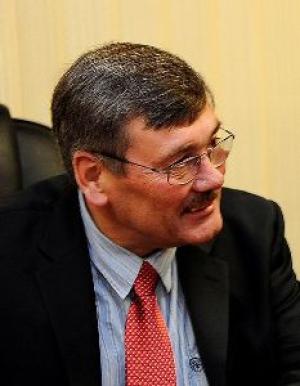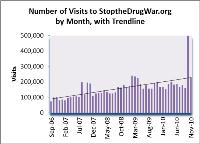This was your year on drugs. Or at least, your year in drug policy reform. Here's our top 10 drug policy issues of the year.
It's been a busy year on the global drug policy front. Here, we look at some of the biggest stories.
Help bring about the brighter future that awaits us beyond prohibition, by making a tax-deductible educational donation or a non-deductible lobbying donation before year's end.
More than 12,000 dead in Mexico's prohibition-related violence as of November 30, according to the Mexican attorney general, and more than 30,000 since Calderon called out the troops in December 2006.
From the Rio Grande Valley to New York City, it's more cops gone wild this week.
The debate over British drug policy heats up again as a Labor stalwart who served as drug czar and defense minister calls for legalization.
An Israeli police raid on a medical marijuana dispensary has sparked protests in Tel Aviv.
A ruling by the European Court of Justice paves the way for the Netherlands to ban foreigners from buying weed in the country's famous coffee shops. Is Amsterdam about to become Amsterdone?
You've heard of jury nullification? How about jury pool nullification? That's basically what happened to a small-time marijuana charge in Montana last week.
The Big Easy just got a little bit easier. Get busted for smoking a joint in New Orleans now and you just get a summons, not a trip to the slammer.
Now, there's a sight for sore eyes! A huge pot legalization billboard has gone up on I-5 outside Seattle.
A lot went on in the realm of drug policy reform in 2010. Here is our summation of what we think are the biggest stories of the year.

fire truck lent by Dr. Bronner's for SSDP/Prop 19 campus tour
California's tax and regulate marijuana legalization initiative, Proposition 19, ultimately failed to get over the top on Election Day, but it garnered 46.5% of the vote, the highest ever for a legalization initiative, and generated reams of media coverage, making it the most watched initiative of any in the land this year. The battle for Prop 19 also yielded the broadest coalition yet behind marijuana legalization, as unions, dissident law enforcement groups, and Latino and African-American groups got on the legalization bandwagon in a big way for the first time. Launched with over a million dollars of funding from Oakland cannabis entrepreneur Richard Lee, the initiative garnered significant additional support during the campaign's final months, including a late $1 million donation from George Soros, but too little and too late to make a difference in the nation's largest and most expensive media market. The coalition that came together around Prop 19 is vowing to stay together and work to place another initiative on the ballot, most likely in 2012.
If California has legalization on the ballot in 2012, activists in Colorado, Oregon, and Washington all took steps this year to ensure that it won't be alone. Ill-funded and controversial legalization initiatives missed making the ballot in Oregon and Washington this year, but organizers in both states have vowed to try again, and Sensible Washington, the folks behind this year's effort there, already have a pro-legalization billboard up on I-5 in the Seattle area. In Colorado, organizers bided their time this year amidst the medical marijuana explosion there, but are busy laying the groundwork for a legalization initiative there.
This year also saw a legalization bill pass out of the California Assembly Public Safety Committee in January, a first in the US. While that bill died later in the session, sponsor Tom Ammiano (D-SF), reintroduced it in March and it awaits further consideration in Sacramento. In New Hampshire, a decriminalization bill passed the House in March, only to be killed in a Senate committee in April, while in Washington state, legalization and decriminalization bills got a January hearing before dying in committee later that same month. In Rhode Island, a decriminalization bill was introduced in February and a state legislative commission endorsed it in March, but the bill went nowhere so far. Later in the year, the California legislature passed and Gov. Arnold Schwarzenegger signed a decriminalization bill there. And in November, a marijuana legalization bill passed the House in the US territory of the Northern Marianas Islands, marking the first time a legalization bill has passed a legislative chamber anywhere in the US. It was later defeated in the Senate. No legalization or decriminalization bills passed this year, but the day is drawing near.
A plethora of public opinion polls this year suggest why, as support for pot legalization is now hovering just under 50%. In January, an ABC News/Washington Post poll had support at 46%; in April, a Pew poll had it at 41%. By July, an Angus-Reid poll had support at 52%, while Rasmussen showed it at 43%. In November, a Gallup poll had support for legalization at 46%, its highest level ever and a 15 percentage point increase over just a decade ago. Some of these polls showed majority support for legalization in the West, which will be put to the test in 2012.
Medical Marijuana -- the Ongoing Battle
The acceptance of medical marijuana continued in 2010, as two states, New Jersey and Arizona, along with the District of Columbia, became the latest to legalize the medicinal use of the herb. It's worth noting, however, that medical marijuana is not yet being produced or consumed in any of those places, even though the New Jersey legislation was signed into law in January and the DC medical marijuana initiative was actually revived last year. To be fair, voters only approved the Arizona initiative in November, and regulators there have three more months to come up with enabling regulations.
But the acceptance is by no means complete, and resistance from recalcitrant law enforcement and local governments continues apace. A medical marijuana initiative in South Dakota and an Oregon initiative to create a system of state-licensed, nonprofit dispensaries both failed in November. And despite efforts to pass medical marijuana bills through numerous state legislatures, none beside New Jersey came to fruition this year. Bills have stalled in Alabama, Illinois, Maryland, New York, and Wisconsin, among others, even as they are continually pared back to be ever more restrictive in a bid to appease opponents.
Medical marijuana states that have less loosely written laws -- all via the initiative process, including California, Colorado, Michigan, and Montana -- proved to be highly contested terrain in 2010. The blossoming of hundreds of dispensaries in Colorado this year led to the passage of regulatory legislation this summer, while a similar, if more limited outbreak of envelope-pushing in Montana has legislators there vowing to rein in the industry when they reconvene next year. In Michigan, law enforcement in some locales has arrested people in apparent compliance with the state law. In all three states, battles have also broken out at the city or county level, especially over efforts to ban medical marijuana operations. These fights will continue.
California is a world of its own when it comes to medical marijuana. The most wide open of the medical marijuana states, which, thanks to the language of Proposition 215, allows for medical marijuana to be recommended for virtually anything, it is also the state where legal and political conflict over medical marijuana is most entrenched. Despite more than a decade of litigation, the legality of selling medical marijuana remains unclear, and depending on the attitude of local authorities, dispensaries can be -- and are -- subject to raids and prosecution. The medical marijuana community dodged a bullet in November when Kamala Harris defeated dispensary arch-foe Steve Cooley, the Republican Los Angeles County prosecutor. Meanwhile, in communities across the state, battles rage over banning dispensaries, or, in happier circumstances, over how to permit and tax them. And medical marijuana is increasingly recognized for the big business it is. A growing number of California towns and cities this year voted to tax medical marijuana, and Oakland gave the go-ahead for massive medical marijuana mega-farms, although it may now retreat in the face of rumblings from the Justice Department. None of this got resolved this year, and the fight over medical marijuana in the Golden State is unlikely to wind down any time soon.
The DEA Continues to Misbehave
And then there's the DEA. It was in October 2009 that the Justice Department released its famous memo telling the DEA to butt out if medical marijuana operations in states that had approved them where not violating state law. While DEA raids have certainly declined from their thuggish heyday in the Bush administration, they have not gone away. After a Colorado medical marijuana grower had the temerity to appear on a local TV news program showing off his garden, the DEA raided him in February. The DEA also hit Michigan medical marijuana operations at least twice, in July and again early this month. The DEA has also raided numerous California medical marijuana operations this year, including the first collective to apply for the Mendocino County sheriff's cultivation permit program and a number of beleaguered San Diego area dispensaries. In most cases, the DEA is relying on the cooperation of sympathetic local law enforcement and prosecutors. Making the DEA live up to the Holder memo is a battle that is yet to be won.
The Obama administration's nomination of acting DEA administrator Michele Leonhart is not a good omen. Despite a horrendous record at the DEA, including a stint as Special Agent in Charge in Los Angeles during the height of the Bush administration raids on medical marijuana facilities, and in St. Louis during the Andrew Chambers "supersnitch" perjury scandal, Leonhart's nomination has cleared the Senate Judiciary Committee and is likely to be approved by the Senate as a whole once she takes some actions to improve access to pain medications for seniors in nursing homes -- an issue on which Sen. Herb Kohl was said will cause him to place a hold on a floor vote until she and the agency address it.
Drug War Juggernaut Continues Rolling
While support for marijuana decriminalization and/or legalization continues to grow, and while a number of states have enacted sentencing reforms in response to fiscal pressures, the drug war juggernaut keeps rolling along, chewing up lives like so much chaff. US law enforcement made more than 1.6 million arrests on drug charges last year, more than half of them for marijuana offenses, marking the first year pot busts made up more than half of all drug arrests. The number is actually down slightly from the previous year, but only marginally so, as drug law enforcement keeps humming along. But in the current economic crunch, such a high level of enforcement and punishment may no longer be sustainable. A Pew report found that state prison populations had declined for the first time since the 1970s, if only by 0.4%, although the federal prison population, more than 60% of which consists of drug offenders, increased by 3.4%. Similarly, the Bureau of Justice Statistics reported than US jail populations had decreased for the first time in decades, dropping by 2.3% over the previous year. The tiny turnarounds are a good thing, but there is a long, long way to go.
Rolling Back the Crack/Powder Cocaine Sentencing Disparity
For the first time in the modern drug war era, Congress this year rolled back a harsh drug sentencing law. The sentencing disparity between crack and powder cocaine offenses had been under the gun for more than decade as it became increasingly evident that the laws were having a racially disproportionate impact. Under the old law, five grams of crack would earn you a mandatory minimum five-year sentence, while it took a hundred times as much powder cocaine to garner the same sentence. Although a majority of crack users are white, blacks accounted for more than 80% of all federal crack cocaine prosecutions. A bill to reduce, but not eliminate, the sentencing disparity passed the Senate Judiciary Committee in March and the Senate as a whole weeks later. The House Judiciary Committee had already passed a similar measure that would completely eliminate the disparity, but the House leadership chose to go along with the Senate, reducing the disparity from 100:1 to 18:1, but not completely eliminating it when it voted to approve the bill in July. President Obama signed the bill into law days later. While passage of the bill is a milestone, it leaves work undone. The sentencing disparity, while reduced, still exists, and thousands of prisoners sentenced under the harsh old law remain in prison because the new law lacks retroactivity.
Demands for Drug Testing of Welfare Recipients, the Unemployed, and Even Politicians
The impulse to score cheap political points by unleashing moralistic wrath on the poor and the unfortunate remained alive in 2010. As in years past, efforts to demand drug testing of unemployment recipients or people receiving welfare benefits went nowhere, but not for lack of trying. In fact, the year was bookended by such efforts, starting with a Missouri bill that would have mandated drug testing for Temporary Assistance to Needy Families (TANF) recipients upon "reasonable cause." That bill passed a Senate committee and the House in February, but died in the Senate after a Democratic filibuster. Similarly, drug testing bills in Kentucky, South Carolina, and West Virginia all died, as did a silly Louisiana bill that would have allowed Louisiana elected officials to submit to a voluntary drug test and post the results on the Internet. Later in the year, successful Florida Republican gubernatorial candidate Rick Scott called for mandatory drug testing of welfare recipients, a call he has vowed to carry out as governor.
Attack of (on) the Synthetic Cannabinoids
Synthetic cannabinoids marketed as incense under names like Spice and K-2 first showed up on the national radar last year, and by early 2010 the prohibitionist impulse began rearing its ugly head in state legislatures across the land. Containing synthetic cannabinoids JWH-018 or JWH-073, synthesized by a university researcher in the 1990s, the stuff was available at head shops, smoke shops, and corner gas stations everywhere, as well as on the Internet. Although no overdose deaths linked to synthetic cannabinoids have been reported, there have been reports of emergency room visits and calls to poison centers by people under its influence. But it wasn't the alleged dangers as much as the fear that someone, somewhere could be getting high without getting into legal trouble that impelled a series of statewide and municipal bans. In March, Kansas became the first state to ban synthetic cannabinoids, followed by Alabama in April, Georgia in May and Missouri in July. Also banning the compounds this year were Arkansas, Kentucky, Louisiana, North Dakota, and Tennessee. Similar legislation was also proposed in several more states, including Florida, Ilinois, and New York. Then, in November, the DEA announced an emergency nationwide ban to go into effect in 30 days, meaning you have until Christmas to use the compounds legally. After that, you're a federal criminal.
SWAT Raids and Drug War Killings
It's not just the massive extent of the drug war that generates criticism, but the law enforcement violence and overkill that too often accompanies it. This year, the now infamous SWAT team raid in Columbia, Missouri, in February that left a dog dead and a family traumatized in a raid over marijuana went got national attention when a video of the raid went viral on the Internet at mid-year. Another SWAT raid in Detroit in May generated outrage when it resulted in the death of 7-year-old girl shot by a raider, and that same month, a Georgia grandmother suffered a heart attack when her home was mistakenly hit by the local SWAT team and DEA agents. And then there was the case of Trevon Cole, a 21-year-old black man killed as he knelt in his own bathroom as the apartment he shared with his pregnant girlfriend was raided over small-time pot sales. The police shooter, of course, was found innocent of any wrongdoing in a coroner's inquest, and now Cole's family is suing. So is the family in the Columbia SWAT raid.
Sentencing Reforms Continue in the States
In a bid to reduce corrections spending, a number of states in the last decade have moved to implement sentencing reforms, and 2010 saw the trend continue. In May, Colorado passed reforms that will reduce some drug use and possession sentences, allow greater judicial flexibility in sentencing, and keep some technical parole violators from being sent back to prison. But the package also increases some drug sales and manufacturing sentences. In June, South Carolina passed reforms that will end mandatory minimum sentences for some drug offenses. In August, Massachusetts passed reforms that will eliminate some mandatory minimums in a bill that was watered down from an earlier Senate version. In all three cases, it was not bleeding hearts but bleeding wallets that was the impetus for reform.
A Congressional Drug Warrior Goes Down in Flames
It couldn’t happen to a nicer guy. This year is also notable for the spectacular May end to the career of inveterate congressional drug warrior Rep. Mark Souder (R-IN). The doughy cultural conservative crusader from the heartland resigned from Congress after admitting at a press conference to having an affair with a female staffer with whom he had once made abstinence videos. Souder is best known to drug reformers as the author of the "smoke a joint, lose your federal aid" provision of the Higher Education Act, and thus deserves credit for almost singlehandedly causing the formation of Students for Sensible Drug Policy. But his enthusiasm for the war on drugs also led him to the chairmanship of the House Government Reform Subcommittee on Criminal Justice, Drug Policy and Human Resources from 2001 to 2007, where he used his position to support harsh drug policies. He was, for instance, a staunch foe of medical marijuana and a loud voice against the Hinchey-Rohrabacher amendments, which would, if passed, have stopped federal raids on medical marijuana patients and providers. To be fair, Souder did offer committee legislation in 2006 to restrict the reach of his student aid penalty, and he was also a key Republican supporter of the recent "Second Chance" prisoner reentry funding legislation. Still, reformers are happy that one of the staunchest and most active drug warriors is out of Congress now, struck down by his own hypocrisy.
back to top
This year saw continued turmoil, agitation, and evolution on the international drug policy front. While we don't have the space to cover all the developments -- the expansion of medical marijuana access in Israel, the rise of Portugal as a drug reform model, the slow spread of harm reduction practices across Eurasia -- here are what we see as the most significant international drug policy developments of the year.
The Mexican Tragedy

San Malverde, Mexico's patron saint of narco-traffickers
The Rising Clamor for a New Paradigm and an End to Drug Prohibition
The critique of the international drug policy status quo that has been growing louder and louder for the past decade or so turned into a roar in 2010. Impelled in part by the ongoing crisis in Mexico and in part by a more generalized disdain for failed drug war policies, calls for radical reform came fast and furious, and from some unexpected corners this year.
In January, the former French Polynesian President Oscar Temaru called for Tahiti to legalize marijuana and sell it to European tourists to provide jobs for unemployed youth. Three months later, members of the ruling party of another island nation spoke out for reform. In traditionally tough on drugs Bermuda, leading Progressive Labor Party members called for decriminalization.
In February, an international conference of political figures, academics, social scientists, security experts, and activists in Mexico City called prohibition in Mexico a disaster and urged drug policies based on prevention, scientific evidence, and respect for human life. By August, as the wave of violence sweeping Mexico grew ever more threatening, President Felipe Calderon opened the door to a discussion of drug legalization, and although he quickly tried to slam it shut, former President Vicente Fox quickly jumped in to call for the legalization of the production, distribution, and sale of drugs. "Radical prohibition strategies have never worked," he said. That inspired Colombian President Juan Manuel Santos to say that he supported the call for a debate on legalization. The situation in Mexico also inspired two leading Spanish political figures, former Prime Minister Felipe Gonzales and former drug czar Araceli Manjon-Cabeza to call for an end to drug prohibition in the fall.
Midsummer saw the emergence of the Vienna Declaration, an official conference declaration of the World AIDS Conference, which called for evidence-based policy making and the decriminalization of drug use. The declaration has garnered thousands of signatures and endorsements, including the endorsements of three former Latin American presidents, Henrique Cardoso of Brazil, Ernesto Zedillo of Mexico, and Cesar Gaviria of Colombia. It has also picked up the support of public health organizations and municipalities worldwide, including the city of Vancouver.
Great Britain has also been a locus of drug war criticism this year, beginning with continuing resignations from the Advisory Council on the Misuse of Drugs. Several members of the official body had quit late last year in the wake of the firing of Professor David Nutt as ACMD after he criticized government decisions to reschedule cannabis and not to down-schedule ecstasy. In April, two more ACMD members resigned, this time in response to the government's ignoring their recommendations and banning mephedrone (see below).
The revolt continued in August, when the former head of Britain's Royal College of Physicians joined the growing chorus calling for radical reforms of the country's drug laws. Sir Ian Gilmore said the government should consider decriminalizing drug possession because prohibition neither reduced crime nor improved health. That came just three weeks after Nicholas Green, chairman of the Bar Council (the British equivalent of the ABA), called for decriminalization. The following month, Britain's leading cannabis scientist, Roger Pertwee called for cannabis to be legalized and regulated like alcohol and tobacco, and the chairman of the Association of Chief Police Officer's drug committee said marijuana should be decriminalized. Chief Constable Tim Hollis said decrim would allow police to concentrate on more serious crime. The following day, the Liberal Democrats, junior partners in a coalition government with the Conservatives, were lambasted by one of their own. Ewan Hoyle called for a rational debate on drug policy and scolded the party for remaining silent on the issue. And just this past week, former Blair administration Home Office drug minister and defense minister Bob Ainsworth called for the legalization of all illicit drugs, including cocaine and heroin.
From Mexico to Great Britain, Vancouver to Vienna, not to mention from Tahiti to Bermuda, the clamor for drug legalization has clearly grown in volume in 2010.
Opium and the Afghan War
More than nine years after the US invaded Afghanistan in a bid to decapitate Al Qaeda and punish the Taliban, the US and NATO occupation drags bloodily on. This year has been the deadliest so far for Western occupiers, with 697 US and NATO troops killed as of December 20. And while the US war machine is fueled by a seemingly endless supply of borrowed cash -- another $160 billion was just authorized for the coming year -- the Taliban runs to a large degree on profits from the opium and heroin trade. In a Faustian bargain, the West has found itself forced to accept widespread opium production as the price of keeping the peasantry out of Taliban ranks while at the same time acknowledging that the profits from the poppies end up as shiny new weapons used to kill Western soldiers and their Afghan allies. The Afghan poppy crop was down this year, not because of successful eradication programs, but because a fungus blighted much of the crop. But even that is not good news: The poppy shortage means prices will rebound and more farmers will plant next year. The West could buy up the entire poppy crop for less than what the US spends in a week to prosecute this war, but it has so far rejected that option.
The Netherlands Reins in Its Cannabis Coffee Shops
Holland's three-decade long experiment with tolerated marijuana sales at the country's famous coffee shops is probable not going to end under the current conservative government, but it is under pressure. The number of coffee shops operating in the country has dropped by about half from its peak, local governments are putting the squeeze on them via measures such as distance restrictions (must be so far from a school, etc.), and the national government is about to unveil a plan to effectively bar foreigners from the shops. The way for that was cleared this month when the European Court of Justice ruled that such a ban did not violate European Union guarantees of freedom of travel and equality under the law within the EU because what the coffee shops sell is an illegal product that promotes drug use and public disorder. Whether the "weed pass" system contemplated by opponents of "drug tourism" will come to pass nationwide remains to be seen, but it appears the famous Dutch tolerance is eroding, especially when it comes to foreigners. Do the Dutch really think most people go there just to visit the windmills and the Rijksmuseum?
Russian Takeover at the UNODC
In September, there was a changing of the guard at the UN Office on Drugs and Crime (UNODC), one of the key bureaucratic power centers for the global drug prohibition regime. Outgoing UNODC head Antonio Maria Costa, a former Italian prosecutor, was replaced by veteran Russian diplomat Yury Fedotov. Given Russia's dismal record on drug policy, especially around human rights issues, the treatment of hard drug users, and HIV/AIDS prevention, as well as the Russian government's insistence that the West resort to opium eradication in Afghanistan (Russia is in the throes of a heroin epidemic based on cheap Afghan smack), the international drug reform community looked askance at Fedotov's appointment. But the diplomat's first missive as ONDCP head talked of drug dependence as a disease, not something to be punished, and emphasized a concern with public health and human rights. Fedotov has shown he can talk the talk, but whether he will walk the walk remains to be seen.
US War on Coca on Autopilot
Coca production is ongoing, if down slightly, in the Andes, after more than a quarter century of US efforts to wipe it out. Plan Colombia continues to be funded, although at declining levels, and aerial and manual eradication continues there. That, and a boom in coca growing in Peru, have led to Peru's arguably retaking first place in coca production from Colombia, but have also led to increased conflict between Peruvian coca growers and a hostile national government. And remnants of the Shining Path have appointed themselves protectors of the trade in several Peruvian coca producing regions. They have clashed repeatedly with Peruvian police, military, and coca eradicators. Meanwhile, Bolivia, the world's number three coca producer continues to be governed by former coca grower union leader Evo Morales, who has allowed a limited increase in coca leaf production. That's enough to upset the US, but not enough to satisfy Bolivian coca growers, who this fall forced Evo's government to repeal a law limiting coca leaf sales.
Canada Marches Boldly Backward
Canada under the Conservatives continues to disappoint. When the Liberals held power in the early part of this decade, Canada was something of a drug reform beacon, even if the Liberals could never quite get around to passing their own marijuana decriminalization bill while in power. They supported Vancouver's safe injection site and embraced harm reduction policies. But under the government of Prime Minister Steven Harper, Canada this year fought and lost (again) to shut down the safe injection site. Harper's justice minister, Rob Nicholson, in May signed extradition papers allowing "Prince of Pot" Marc Emery to fall into the clutches of the Americans, in whose gulag he now resides for the next four years for selling pot seeds. And while Harper's dismissal of parliament in January killed the government's bill to introduced mandatory minimum sentences for a number of offenses, including growing as few as five pot plants, his government reintroduced the bill this fall. It just passed the Senate, but needs to win approval in the House of Commons. The Conservatives won't be able to pass it by themselves there, so the question now becomes whether the Liberals will have the gumption to stand against it. This as polls consistently show a majority of Canadians favoring marijuana legalization.
A New Drug Generates a Tired, Old Response
When in doubt, prohibit. That would seem to be the mantra in Europe, where, confronted by the emergence of mephedrone, a synthetic stimulant derived from cathinone, the active ingredient in the khat plant, first Britain and then the entire European Union responded by banning it. Described as having effects similar to cocaine or ecstasy, mephedrone emerged in the English club scene in the past 18 months, generating hysterical tabloid press accounts of its alleged dangers. When two young people supposedly died of mephedrone early this year, the British government ignored the advice of its Advisory Council on the Misuse of Drugs, which called for it to be a Schedule B drug, and banned it. Poland followed suit in September, shutting down shops that sold the drug and claiming the power to pull from the shelves any product that could be harmful to life or health. And just this month, after misrepresenting a study by the European Monitoring Center on Drugs and Drug Addiction, the EU instituted a continent-wide ban on mephedrone. Meet the newest entrant into the black market.
Heroin Maintenance Expands Slowly in Europe
Heroin maintenance continues its slow spread in Europe. In March, Denmark became the latest country to embrace heroin maintenance. The Danes thus join Germany, the Netherlands, Switzerland, and, to a lesser degree, Britain, in the heroin maintenance club. In June, British scientists rolled out a study showing heroin maintenance worked and urging the expansion of limited existing programs there. The following month, a blue-ribbon Norwegian committee called for heroin prescription trials and other harm reduction measures there. Research reports on heron maintenance programs have shown they reduce criminality among participants, decrease the chaos in their lives, and make them more amenable to integration into society.
Opium is Back in the Golden Triangle
Okay, it never really went away in Laos, Burma, and Thailand, and it is still below its levels of the mid-1990s, but opium planting has been on the increase for the last four years in the Golden Triangle. Production has nearly doubled in Burma since 2006 to more than 38,000 hectares, while in Laos, production has more than doubled since 2007. The UNODC values the crop this year at more than $200 million, more than double the estimate of last year's crop. Part of the increase is attributable to increased planting, but part is accounted for by rising prices. While Southeast Asian opium production still trails far behind that in Afghanistan, opium is back with a vengeance in the Golden Triangle.
back to top
As year's end approaches, I hope you will make a generous donation to support our campaigns in 2011.
StoptheDrugWar.org traffic has grown dramatically, as the chart to the left shows, most recently reaching half a million people during the month preceding the election. But the improvements to our web site and publishing which made that possible haven't stopped:
- We are installing a new look on the site reflecting the optimism of the post-Prop 19 era.
- We are setting up a mobile StoptheDrugWar.org web site.
- We are preparing a major expansion of our publishing that will provide powerful tools to activists, journalists, policymakers and others to help them understand and make the case for drug policy reform.
Your support plays a major role in deciding just how far we can take these campaigns. Please make a generous donation to support our campaigns in 2011. A tax-deductible donation to DRCNet Foundation will support our educational programs; a non-deductible donation to Drug Reform Coordination Network will support our lobbying work. Donations can be made online by credit card or PayPal, and you can also use our donation form to print out a convenient form to mail in. Or, you can send a check or money order instead to P.O. Box 18402, Washington, DC 20036. Contact us for info if you are interested in donating stock.
As our thanks for your support, we continue to offer a wide range of books, videos and StoptheDrugWar.org gift items to members donating over certain levels -- visit our donation page to see the full list, or choose from among our three newest feature items:
- Cannabinomics: The Marijuana Policy Tipping Point, book by Dr. Christopher Glenn Fichtner, points the way to a brighter future beyond the current drug war. (See our review of Cannabinomics here.)
- Emperor of Hemp, a re-released memorial tribute edition of the classic video, honors the movement pioneer Jack Herer whose efforts enabled much more to follow. (See our review of Emperor of Hemp here.)
- My Medicine, by Irvin Rosenfeld, tells his story as one of now only four patients in the federal government's medical marijuana program, and chronicles the history of medical marijuana as it's unfolded in the US to its incredible place today.
| |  |
| |
Donate $15 or more for Emperor of Hemp, $35 or more for Cannabinomics or My Medicine, $45 for the video and either book, $60 for both books, or $75 or more to get all three.
We have made huge strides, and reform activists from the rank-and-file up through the leadership tell us what a difference our work makes for them. But we need your help to ensure that this time of change will bring needed change, for a disadvantaged, demonized and under-represented group in our society, the targets of the brutal War on Drugs. Please donate generously today, and together we will make things happen.
Thank you very much for working to change this country's drug policies and for continuing to be part of StoptheDrugWar.org. And thank you for lending your support to our efforts at this important hour. Your contribution has never been more important.

David Borden, Executive Director
StoptheDrugWar.org (DRCNet)
Washington, DC
A Brighter Future Beyond Prohibition
P.S. Every day that goes by, 4,000 people are arrested for drug offenses, the vast majority of them minor, and half a million nonviolent drug offenders languish yet another day in the staggering number of prisons and jails the government has very unwisely built. It's time to stop this senseless tragedy and shocking injustice. Please increase your commitment to ending the drug war by donating to StoptheDrugWar.org today. Thank you!
back to top
by Bernd Debusmann, Jr.
Mexican drug trafficking organizations make billions each year smuggling drugs into the United States, profiting enormously from the prohibitionist drug policies of the US government. Since Mexican president Felipe Calderon took office in December 2006 and called the armed forces into the fight against the so-called cartels, prohibition-related violence has killed more than 30,000 people, including more than 12,000 this year. The increasing militarization of the drug war and the arrest of dozens of high-profile drug traffickers have failed to stem the flow of drugs -- or the violence -- whatsoever. The Merida initiative, which provides $1.4 billion over three years for the US to assist the Mexican government with training, equipment and intelligence, has so far failed to make a difference. Here are a few of the latest developments in Mexico's drug war:

Zetas wanted poster, US State Dept.
In Chihuahua, Marisela Escobedo Ortiz was shot and killed in front of the governor’s office. Ortiz had been well-known for her protests and activism after the 2008 murder and dismemberment of her 16-year old daughter Rubi Frayre by her boyfriend Sergio Barraza. Barraza, thought to be a Zeta, was captured a year later in Zacatecas but was released after being exonerated by a Mexican court. Another court reversed the decision, but Barraza remains a fugitive. Barraza is thought to have ordered the killing of Ortiz, and had previously been implicated in several death threats against her life. The murder was caught on security camera video.
On Friday, heavily armed gunmen burned down a lumberyard belonging to Ortiz’s partner, Jose Monje Amparan. His brother, Manuel, 37, was kidnapped during the attack. He was later tortured, strangled and thrown from a moving vehicle.
Friday, December 17
In Nuevo Laredo, Tamaulipas, over 140 inmates escaped through the main vehicle entrance of a prison. It is suspected that prison guards were complicit in the escape. The prison director is missing along with the 141 escapees. Soldiers and Federal Police surrounded the prison after the incident.
In Zuazua, Nuevo Leon, a car bomb exploded outside a police station, wounding two people. It is unclear whether the two events are related, but the Zetas and Gulf Cartel are both extremely active in Tamaulipas and Nuevo Leon.
Saturday, December 18
In Ciudad Juarez, at least six people were murdered in several incidents. In one incident, a car with Oklahoma license plates was ambushed by gunmen, killing two men and wounding an 18-year old female and three children. In another incident, a man was found dead and wrapped up in a blanket. These killings bring the December total to 130. The yearly total is now being variously being reported as being somewhere between 3,000 and 3,100.
Sunday, December 19
In Guatemala, authorities declared a state of siege in Alta Verapaz province. According to the Guatemalan government, several cities in the province -- including the capitol, Coban -- have been overrun by members of the Mexican Zetas organization. Under the state of siege, the army is allowed to detain suspects and conduct searches without warrants, as well as control local gatherings and local media.
[Editor's Note: No body count this week because El Universal, on which we rely, has not updated theirs. But the Mexican attorney general's office reported last week that this year's death toll had reached 12,456 as of November 30 and that the number of dead since Calderon called out the troops in December 2006 was 30,196 -- although they conceded the numbers could be higher.]
back to top
From the Rio Grande Valley to New York City, it's more cops gone wild this week. Let's get to it:
In Houston,
a Harris County sheriff's deputy was charged December 16 with possession of a large amount of cocaine in what authorities said was a case of a cop protecting drug dealers and their product. Deputy Richard Bryan
Nutt Jr., 43, came under investigation after authorities got information he was protecting loads of drugs. Prosecutors say he helped dealers by stopping the vehicles of people they had sold large quantities of cocaine to, seizing the drug, and returning it to the original dealer. Police recovered nearly 4 1/2 pounds of cocaine in the investigation, they said. He and three other men were all charged with possession with intent to distribute cocaine, as well as with using a firearm while committing a felony.
Nutt is now out on $20,000 bail.
In Atlanta,
a US Customs and Border Protection officer was arrested December 16 on drug and gun smuggling charges after getting caught in a sting operation linked to a large seizure of ecstasy. Officer
Devon Samuels took $72,000 in cash from undercover officers and smuggled it to Jamaica, accepted five firearms and $20,000 in alleged drug money from another agent, and checked government computers to see if he or associates were under investigation.
In New York City, an
NYPD officer pleaded not guilty December 15 in a scheme to buy $40,000 worth of
ketamine to distribute at raves. Officer
Kifah Othman, 40, allegedly tried to score the Special
K from a former cop-turned-tattoo-parlor-operator who is cooperating with the feds in a bid for leniency in a narcotics case.
Othman has been suspended and is free on $250,000 bond. He faces up to 10 years in prison if convicted.
In Brownsville, Texas,
a Cameron County sheriff's deputy pleaded guilty Friday to trying to smuggle weapons into Mexico in exchange for money. Jesus Longoria, 31, admitted to trying to smuggle 13 weapons he believed were destined for a drug cartel into Mexico in exchange for $4,000. Longoria waved a driver through on an international bridge after contacting him via cell phone to tell him when it was safe to cross. Unfortunately for Longoria, the driver was an undercover federal agent. He faces up to 10 years in federal prison and is being held in custody pending his March 14 sentencing.
In St. Martinville, Louisiana,
a former St. Martinville police officer was sentenced Friday to three years in prison for stealing cash, guns, and drugs from the department's evidence room to support her gambling habit. Charlotte Durand, 57, a 20-year veteran, was working as the department's evidence custodian when she was arrested in April 2009. Durand pawned her department issued gun in December 2007, and after that, began stealing guns, cash, and cocaine from the evidence room. She was originally charged with three counts of malfeasance in office and two counts of felony theft, but pleaded guilty in March to one count of malfeasance in office and one count of felony theft as part of a plea agreement.
In Atlanta,
a former Atlanta police officer was sentenced December 16 to 12 years in prison on drug and corruption charges. Lucius Solomon III, 32, went down after offering protection for what he thought were large cocaine loads, and doing so while in uniform and on duty. He pleaded guilty on September 2.
In Woodward, Oklahoma,
a former Woodward police detective is under investigation after he admitted stealing methamphetamine from a department evidence locker. Former officer Mike Morton told an unrelated federal court hearing in July that he stole the meth and gave it to his wife. The pair divorced in June. The Oklahoma Bureau of Investigation is now examining the evidence in some 2,500 cases to see what, if anything is missing.
back to top
Former Home Office drug minister and former Defense Minister Bob Ainsworth has called for all illegal drugs, including cocaine and heroin, to be legalized. He told the House of Commons Friday that addicts should be prescribed heroin rather than allowing global criminal organizations to handle and get rich from the illicit drug trade.

Bob Ainsworth breaks ranks with drug prohibition. (image courtesy Wikimedia)
Ainsworth called in the House of Commons for a fundamental rethink of British drug policy. Ainsworth's call was met with support from some MPs from all parties, but was
roundly criticized by his own Labor Party.
Ainsworth served as head of drug policy under former Prime Minister Tony Blair, and as Blair's defense minister, he oversaw the British effort to eliminate opium planting in Afghanistan.
"Prohibition has failed to protect us. Leaving the drugs market in the hands of criminals causes huge and unnecessary harm to individuals, communities and entire countries, with the poor the hardest hit," Ainsworth said in remarks reported by
The Independent. "We spend billions of pounds without preventing the wide availability of drugs. It is time to replace our failed war on drugs with a strict system of legal regulation, to make the world a safer, healthier place, especially for our children. We must take the trade away from organized criminals and hand it to the control of doctors and pharmacists."
Ainsworth said his experiences in Afghanistan had been an education. "Bombs and bullets and the wherewithal to produce IEDs are bought by funds supplied by international drugs," he said. A massive NATO occupation had failed to stamp out the heroin traffic, he said, so it was now time to consider "taking the market away" by legalizing drugs.
Former deputy Conservative leader Peter Lilley said he favored legalizing marijuana, while continuing to keep hard drugs illegal. Still, he supported Ainsworth's call for a reexamination of British drug policy. "I support Bob Ainsworth's sensible call for a proper, evidence-based review, comparing the pros and cons of the current prohibitionist approach, with all the alternatives, including wider decriminalization, and legal regulation."
"This could be a turning point in the failing UK 'war on drugs,'" said Labor MP Paul Flynn, a legalization supporter.
But Labor's leadership was quick to distance itself from Ainsworth's remarks. "Bob's views do not reflect Ed's views, the party's view or indeed the view of the vast majority of the public," a spokeswoman for Labor Leader Ed Miliband said.
Ainsworth's remarks were "extremely irresponsible," said an unnamed party source. "I don’t know what he was thinking."
back to top
An Israeli police raid Wednesday on the Rehov Ibn Gvirol medical marijuana dispensary Tel Aviv sparked protests Sunday by aggrieved patients, the Jerusalem Post reported. The dispensary, which is operated by Tikkun Olam, the country's largest medical marijuana supplier, remained closed after the raid.

(image from jewlicious.com)
Dozens of disabled and terminally ill patients protested outside the clinic, waving ID cards and clamoring to receive their monthly medicine. Tikkun Olam set up a makeshift sales counter in the courtyard of the building, where dozens more medicated on the spot.
Police said they suspected significant amounts of marijuana had been given to criminal organizations that used fake prescriptions. Police detained two managers at the storefront and questioned them for hours about illegal drug trafficking.
Police also claimed they had received complaints the group was handing out marijuana in amounts greater than the 30 grams a month allowed under Israeli regulations. Israel has suffered from a hashish shortage for the past year, and police believe criminal elements are diverting medical marijuana to the black market.
But Tikkun Olam spokesman Shai Meir told reporters that the raids served only to harm legitimate medical marijuana patients. "The bottom line is that the only ones who have suffered as a result of these police actions are the patients. Every arrest, every detention of a patient disrupts their treatment, treatment that demands routine. This causes serious harm to the patients," Meir said.
One patient who took part in the protest, Yedidya Kanuf, said medical marijuana was a lifesaver for him. As he spoke, he sat inside the apartment in a wheelchair hooked up to a portable oxygen system. Kanuf has been paralyzed since a car accident a decade ago.
"Before I was on medical marijuana, I was being treated for pain with all types of very strong drugs. I never got out of bed, never saw the sun. Once I started taking prescription cannabis the amount of drugs I took plummeted. When people call it a drug I get annoyed, because for me it has given me life," Kanuf said, his breathing labored.
back to top
Saying the effort to combat drug use and drug tourism outweighed European Union provisions for equal treatment for all EU citizens, the European Court of Justice last Thursday upheld a Dutch border town's ban on the sale of marijuana to foreigners. The ruling paves the way for Holland to institute a national "weed pass" to keep non-Dutch out of the nation's famous coffee shops.

Can windmills and the Rijksmuseum pack 'em in like the coffee shops? (wikimedia.org)
The ruling came in
Josemans v. Maastricht, in which
Maastricht coffee shop owner Marc Michel
Josemans challenged a 2005
Maastricht ban on selling cannabis products to non-residents. He was forced to temporarily close his shop after selling to foreigners in order to set up a test case.
Josemans challenged the law in Dutch administrative courts, which asked the European Court of Justice to review the issue.
"The prohibition on the admission of non-resident to Netherlands 'coffee shops' complies with European Union law," the court held. "That restriction is justified by the objective of combating drug tourism and the accompanying public nuisance, an objective which concerns both the maintenance of public order and the protection of the health of citizens at the level of the Member States at European level."
Josemans had argued that barring foreigners from the coffee shops amounted to illegal discrimination under EU law, but the court held that because their product was illegal, coffee shop owners could not rely on EU protections: "As the release of narcotic drugs into the economic and commercial channels of the European Union is prohibited, a coffee-shop proprietor cannot rely on the freedoms of movement or the principle of non-discrimination in so far as concerns the marketing of cannabis," the court held.
The ruling opens the way for Holland's conservative Liberal/Christian Democrat governing coalition to institute a nationwide ban on foreigners purchasing marijuana at the coffee shops. The government is planning to introduce a "weed pass" that will be required to purchase pot and will only be available to Dutch citizens and legal residents.
"If the Council of State rules that access to coffee shops can be limited to inhabitants of the Netherlands, then the weed pass this Cabinet wants to introduce can be limited to inhabitants of the Netherlands and that helps combat drug tourism," Justice Ministry spokesman
Wim van
der Weegen told
Bloomberg News Friday.
Barring foreigners may be a Pyrrhic victory for Dutch border towns.
Maastricht alone sees 10,000 visitors a day, mostly from Belgium, Germany, and France. The number of those visitors who come primarily to purchase marijuana is substantial, and, of course, pot isn't all they purchase. Income and tax revenues from border city coffee shops are likely to decline precipitously.
The looming ban on foreigners in coffee shops is just part of a larger crackdown on the shops in Holland. Their numbers have shrunk by about half from their peak as local governments seek to close shops that have violated the law, are too close to schools, or otherwise inconvenient for local authorities. The national government is also hostile.
back to top
No way would they convict someone of possessing a 16th of an ounce of marijuana, member after member of a Missoula County jury pool told a stunned judge and prosecutor last week. As a result, the Missoulian newspaper reported, the judge in the case ordered a recess, and a plea bargain was reached in a drug trafficking case against Touray Cornell.

not business as usual at the courthouse in Missoula (image courtesy Wikimedia)
Potential jurors repeatedly told the court they would not convict for a couple of buds found during a raid on Cornell's home in April. One juror wondered out loud why the county was wasting time and money prosecuting the case at all, especially in a locale that approved a 2004 initiative making marijuana possession offenses the lowest law enforcement priority.
After that juror questioned the prosecution, District Judge Dusty Deschamps polled the jury pool and found at least five others who agreed. That was in addition to two others who had already been excused because of their philosophical objections to pot prosecutions.
"I thought, 'Geez, I don't know if we can seat a jury,'" Deschamps said, explaining why he called a recess.
Instead, Deputy District Attorney Andrew Paul and defense attorney Martin Ellison worked out a plea agreement on the more serious drug trafficking charge. Cornell entered an Alford plea, in which he did not admit guilt. He was then sentenced to 20 years in prison with 19 suspended. Since Cornell has already served 200 days awaiting trial, he should be out in a matter of months.
"Public opinion, as revealed by the reaction of a substantial portion of the members of the jury called to try the charges on Dec. 16, 2010, is not supportive of the state's marijuana law and appeared to prevent any conviction from being obtained simply because an unbiased jury did not appear available under any circumstances," according to the plea memorandum filed by his attorney.
It was "a mutiny" by the jury pool, said Paul.
"I think it's going to become increasingly difficult to seat a jury in marijuana cases, at least the ones involving a small amount," Deschamps said.
Noting changing attitudes toward marijuana, as evidenced by the Missoula initiative and voters' approval of the state's medical marijuana law, Deschamps wondered if it were fair to insist on impaneling a jury that consisted only of "hardliners" who object to all drug use. "I think that poses a real challenge in proceeding," he said. "Are we really seating a jury of their peers if we just leave people on who are militant on the subject?"
"I think that's outstanding," John Masterson, who heads
Montana NORML, said when told of the incident. "The American populace over the last 10 years or so has begun to believe in a majority that assigning criminal penalties for the personal possession of marijuana is an unjust and a stupid use of government resources."
Deputy DA Paul said that normally a case involving such a small amount of pot wouldn’t have gone that far through the court system, but for the felony charge involved. But the response of the jury pool "is going to be something we're going to have to consider" in future cases, he said.
back to top
In a bid to reduce congestion in the city's criminal courts, the New Orleans City Council voted last Thursday to make marijuana possession, prostitution, and two other minor crimes municipal offenses. That gives police the option to issue a summons instead of making an arrest.

The New Orleans City Council just made life a bit easier in the Big Easy.
Up until now, pot possession and the other offenses have only been addressed by state laws, which required police to arrest and book offenders. With the offenses now municipal, police are no longer required to make arrests, saving the city the expense of booking, housing and feeding jailed pot smokers. The move will also reduce the caseload of judges and prosecutors, who also handle serious felonies.
"These ordinances will contribute significantly to the city's efforts to promote greater efficiency and equity in our criminal justice system, particularly for our police officers, the District Attorney's office and in the criminal court," said Councilwoman Susan Guidry, co-chair of the council's Criminal Justice Committee. "These measures have unanimous support from the City's criminal justice agencies, and we are thankful for the many people who have worked so hard on this initiative."
Possession of marijuana or synthetic cannabinoids, prostitution, a driver's failure to stop when a police officer has used flashing lights and a siren to signal the driver to stop, and refusing to leave the scene of a crime or accident when ordered to do so by police are the four offenses that will now be dealt with by summonses.
While it is a scaling back of marijuana enforcement, the council's move does not amount to true decriminalization. Like Louisiana state law, the new city municipal ordinance carries a maximum penalty of a $500 fine and/or six months in jail.
District Attorney Leon Cannizzaro complained mightily when he took office in 2008, only to find more than a thousand marijuana possession cases clogging his docket. At his urging, the city already tries pot possession cases in municipal court, but Thursday's ordinances mean the prosecution of those cases can be shifted from Cannizzaro's office to the city attorney's office.
The ordinances are a continuation of ongoing efforts by the city council to reduce the number of people arrested and jailed for minor offenses in the city. Two years ago, the council passed ordinances directing police to issue written summons instead of arresting people found with outstanding traffic warrants and a number of municipal offenses, including disturbing the peace, trespassing, making threats, urinating in public, playing loud music and public intoxication.
New Orleans police arrested 58,219 people in 2007. Half of those arrested were for municipal or traffic offenses. Although no hard numbers are available, the measures undertaken since then have certainly decreased that percentage, and Thursday's ordinance should see it decline further.
back to top
Commuters on the busy I-5 freeway near Seattle will get a daily reminder that an effort to legalize marijuana in Washington state is underway. Sensible Washington, the group behind this year's initiative effort that failed to make the ballot, has put up a billboard saying "Because Drug Dealers Don't ID... Legalize in 2011," with the group's web address and a pot leaf superimposed on a state map.

(image courtesy Sensible Washington)
Although Sensible Washington's 2010 initiative effort was hampered by criticism and lack of support from key elements of the state's drug reform community, the group is back and is aiming at getting its initiative on the ballot next year.
The huge, bright yellow billboard is installed at mile marker 138 in Fife, Washington, between Tacoma and Seattle. The double-sided sign faces both north- and south-bound traffic and will be seen by more than a quarter-million vehicles per day.
The billboard will remain up through the November 2011 election. That means commuters passing it twice daily will have seen the message more than 400 times each by Election Day.
"Thanks to generous donations from two Sensible Washington volunteers and support and cooperation of the billboard company,
Gotcha Covered Media (thank you!), we now have North- and South-facing billboards at this location through the November 2011 election," the group announced on its web site.
back to top












